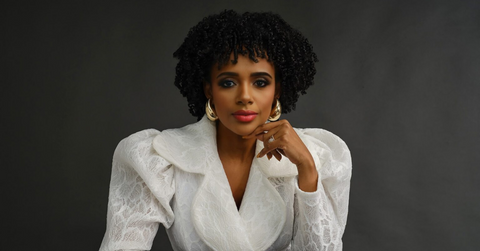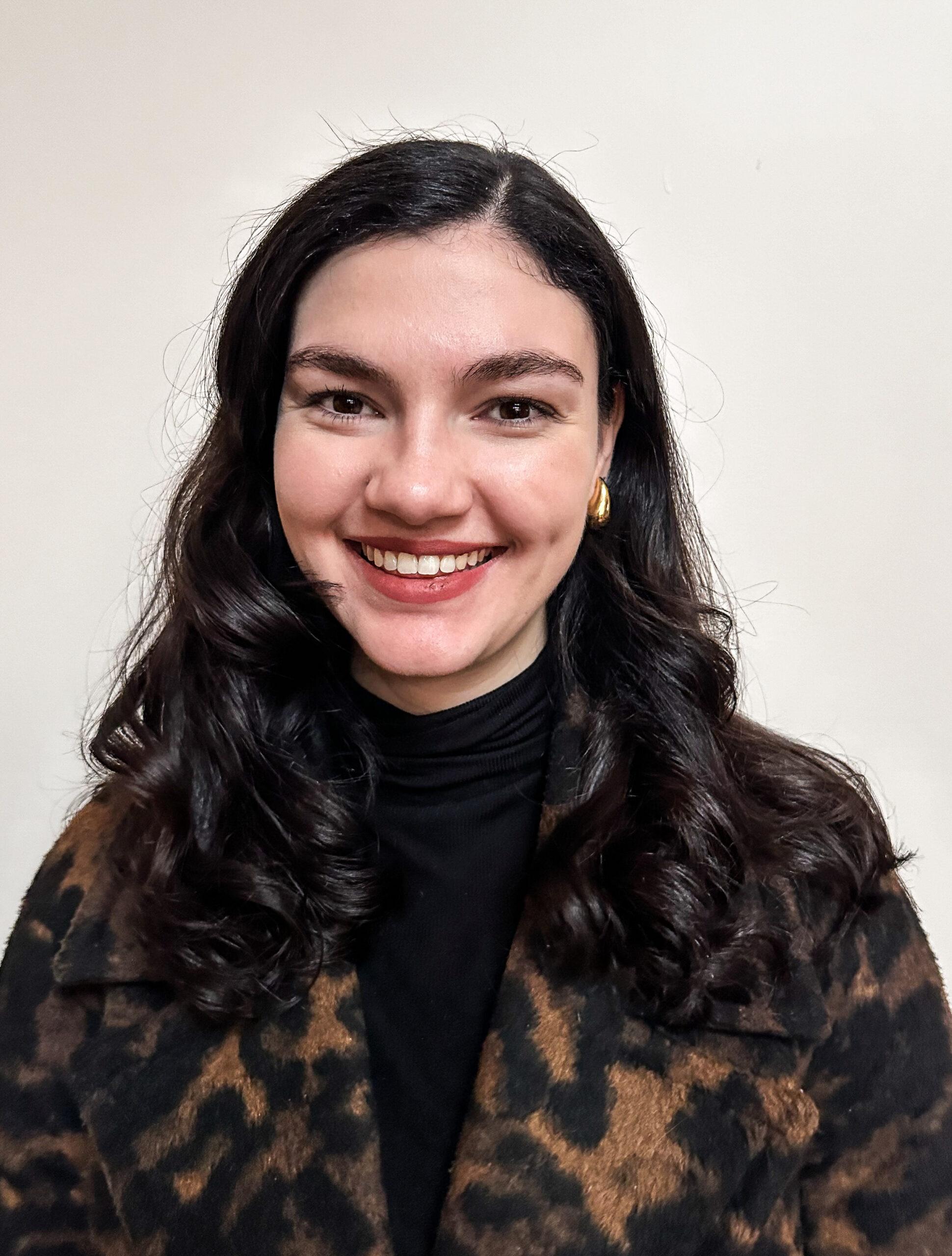Rahiel Tesfamariam, a former Washington Post columnist, quickly learned that her career path would be anything but linear. Indeed, it has branched out into diverse roles, including social activist, journalist, international speaker, author, and public theologian. She’s also the founder of Urban Cusp, an online community fostering the power of change and global awareness. Rahiel has won various awards for her work in social justice and media from organizations, including the National Association of Black Journalists (NABJ) Salute to Excellence Digital Media Award.
Rahiel joined us to discuss her most recent book, Imagine Freedom: Transforming Pain into Political and Spiritual Power, and the cultural, political, and spiritual elements that led her down the path of becoming the author and activist she is today.
Rahiel joined us to talk about her most recent book Imagine Freedom: Transforming Pain into Political and Spiritual Power and the cultural, political, and spiritual elements that led her down the path of becoming the author and activist she is today.
Her Agenda: I saw that you wrote the book Imagine Freedom. Can you tell us a little more about it and the inspiration behind it?
Rahiel Tesfamariam: Imagine Freedom comes in the aftermath of the global pandemic. I started working on the proposal after, well, I started working on the proposal during the pandemic. And so initially, I thought I was [going to] write a book about trauma because of all the grief and trauma that Americans and people all over the world were enduring because of the pandemic. But I decided that trauma was not the place to end. And so I asked, what’s on the other side of trauma, and it was healing. And so I decided to write a book that intersects freedom and healing. And the book is about the Black liberation struggles, past, present, and future. What are some of the issues that we’re still facing? What are things that we need to think more critically about? [Considering things] like our relationship to Africa and their African freedom struggle. So it looks at the Black freedom struggle through the lens of a continuum of the past, present, and future because I believe that freedom is the intersection of all those things as well. Healing is as well.
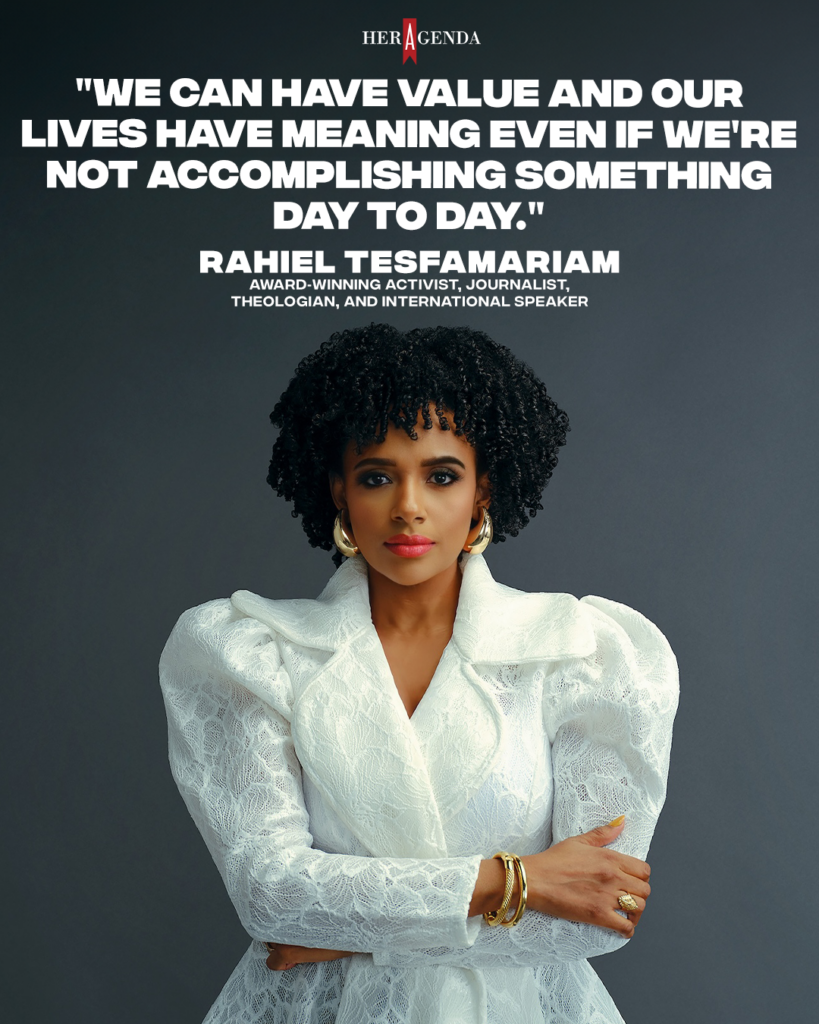
Her Agenda: How can freedom be understood as a sustained collective healing journey in contrast to the American narrative of the individualistic hero’s journey?
Rahiel Tesfamariam: There are a lot of ways in which I touch on this in the book. One is a lot of the self-blame that we place on ourselves for things that we don’t accomplish or things that are not going the way that we want. Looking at our shared struggle in this country, a lot of these issues are collective issues that are inflicted upon us because of racial disparity, socioeconomic disparities, and white supremacy. So, one, looking at our problems and suffering and pain as a collective struggle. And if our pain and suffering are collective, then surely our merging out of it has to be a collective endeavor as well.
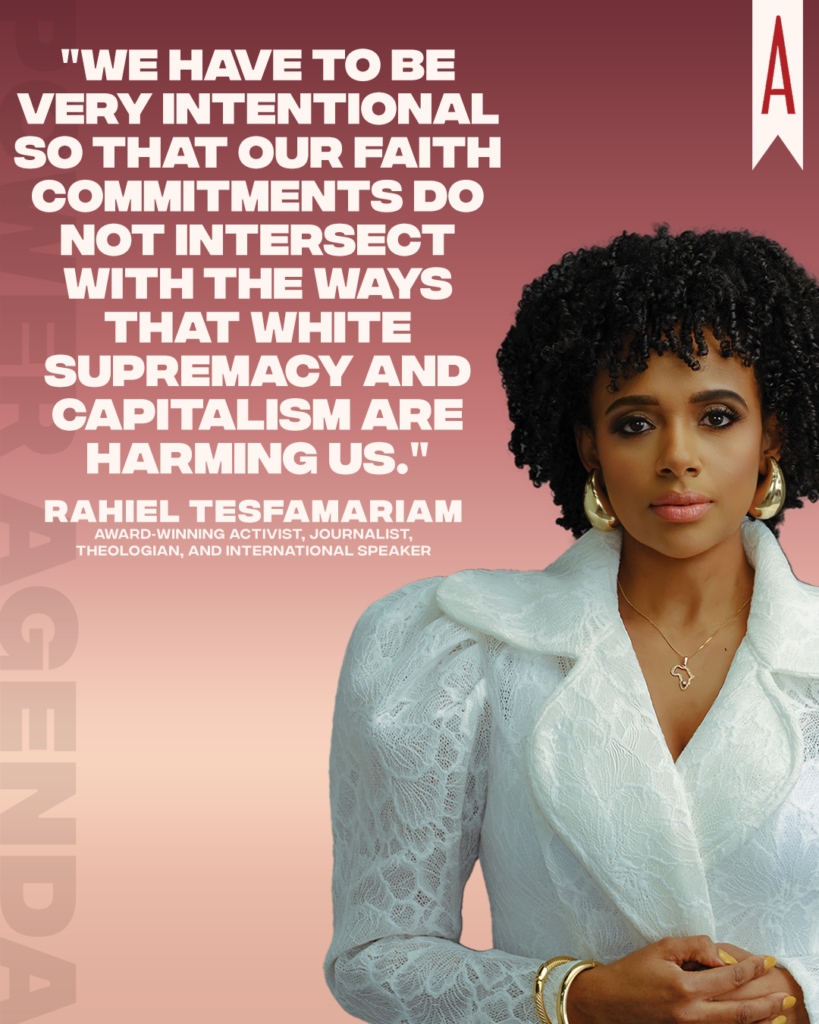
Her Agenda: In regards to capitalism, what do you think it means to be zombies and batteries in today’s capitalistic system? And how do you think we can break free as individuals from these types of boundaries placed upon us?
Rahiel Tesfamariam: I use the metaphor of zombies as in the context of Fela Kuti’s song to talk about how we can become instruments of the state, how we can mindlessly follow what the state wants us to do and not think critically and not think for ourselves about the way that we ourselves can perpetuate pain and trauma. So the book really calls on us to break free from the cycle of being zombies always looped into the American dream and the American search for more wealth and more comfort and more luxury. And then the notion of batteries is that there’s always the threat of burnout because we’re constantly trying to make more money and always pushing the standards of success. Then, we push ourselves to the brink of destruction by always thinking that what we’re doing is not enough. And so this is the loop for being zombies and batteries. And we come out of it, one, by acknowledging that we’re caught up in this loop, that we’re not simply trying to achieve because we think that’s the best thing for us, but we’re in a society engineered for us to think that all we should be doing every day is being productive. Part of it is understanding our worth independent of our productivity, that we can have value and our lives have meaning even if we’re not accomplishing something day to day. And that’s very hard for most Americans to believe that their lives have worth and value independent of being productive.
Her Agenda: I know you touched on this a little bit as well, but maybe as an expansion, how do you think the brand of the US differs from the reality of its history and present identity in the world?
Rahiel Tesfamariam: Well, the US, of course, has always marketed itself as the epicenter of democracy and freedom, but it’s a long history of subjugation that’s tied to that. It’s a long history of alienation and isolation and figuring out who’s neighbor and who’s not neighbor. And so the idea that we’re all one when the reality is America does not acknowledge the contributions of immigrants does not acknowledge how instrumental diversity has been to the success of the country and how critical the role of slavery was to build up this nation. And so it prides itself on a myth of almost perfectionism. We pride ourselves on being this perfect nation, but what that does is prevent us from being honest with ourselves about how much harm America has caused us and caused the rest of the world.
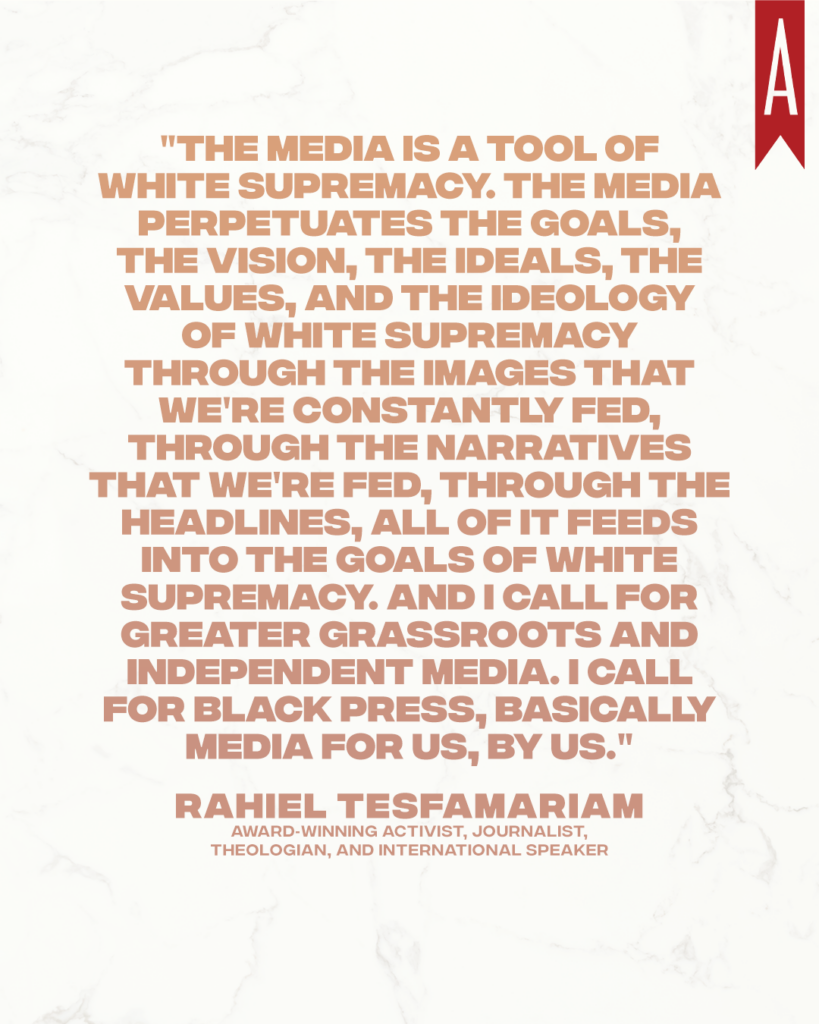
Her Agenda: How do you think the media has played a part in all of this? And how can it be used as a site of resistance for all oppressed groups?
Rahiel Tesfamariam: Well, I argue in the book that the media is a tool of white supremacy. The media perpetuates the goals, the vision, the ideals, the values, and the ideology of white supremacy through the images that we’re constantly fed, through the narratives that we’re fed, through the headlines, all of it feeds into the goals of white supremacy. And I call for greater grassroots and independent media. I call for Black press, basically media for us, by us. But we also need media that is for us and by us that does not perpetuate an agenda that is not in our best self-interest.
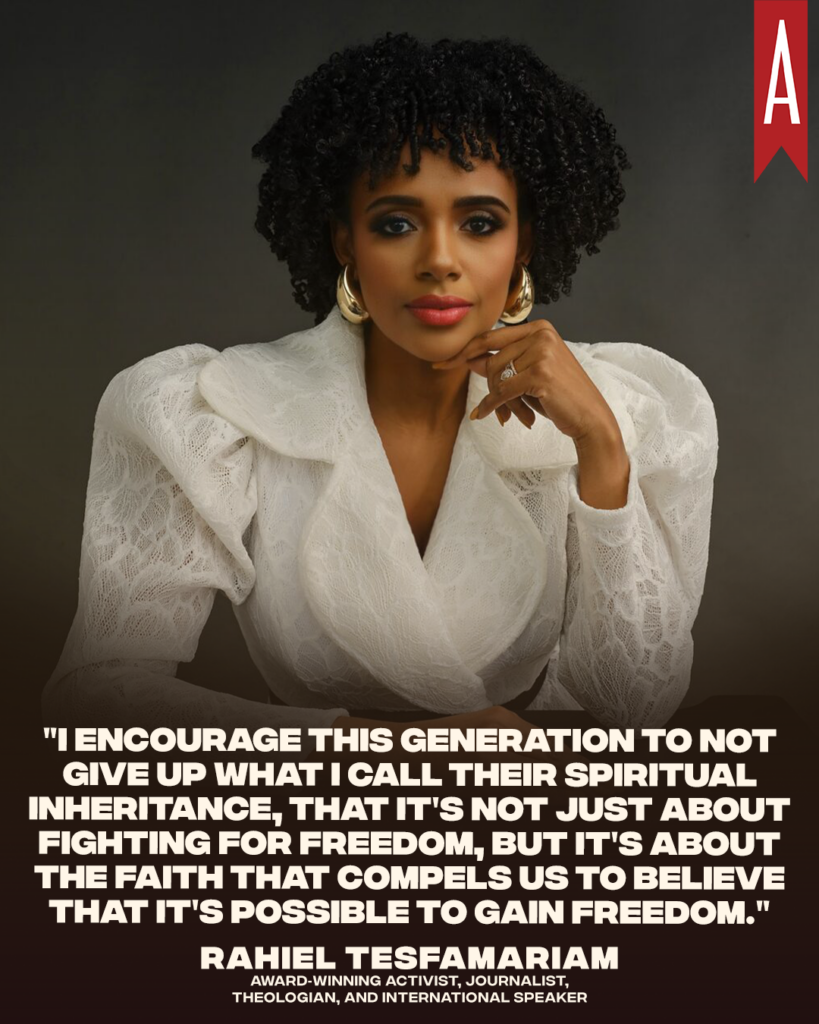
Her Agenda: How does the concept of the American Dream keep people invested in capitalism? And why do you think there is a need to resist it through a commitment to collective dreaming?
Rahiel Tesfamariam: The American dream makes people think that it’s in the best interest of the individual to pursue it. Of course, it’s in your best interest to get the house, to get the car, and all of this is in your best interest. But without a critical analysis of what can often happen to an individual constantly striving and striving endlessly to try to achieve these goals and living in a very competitive society where the benchmark is no longer even to be a millionaire, but now the benchmark is even for many now to be a billionaire. It’s gone from just a middle-class upbringing and a middle-class life to thinking that we’re not doing anything of value unless we’re multimillionaires and that the ultimate goal is being a billionaire. And so all of it is driven by this capitalistic notion of achievement, progress, and success, but it depletes us. It drains us. And we have to think more holistically about what our individual and collective goals for advancement look like. They may not look like consumption. They may not look like productivity by gaining more and consuming more. Collective dreaming may look like ensuring the well-being and the safety of everyone around us and ourselves. It may look like ensuring future generations don’t deal with capitalism in the same way that we deal with it. It may look like our men having more healthy conceptions of masculinity and our women not being fed lies about standards of beauty. Collective dreaming puts us on a very different pathway to freedom.
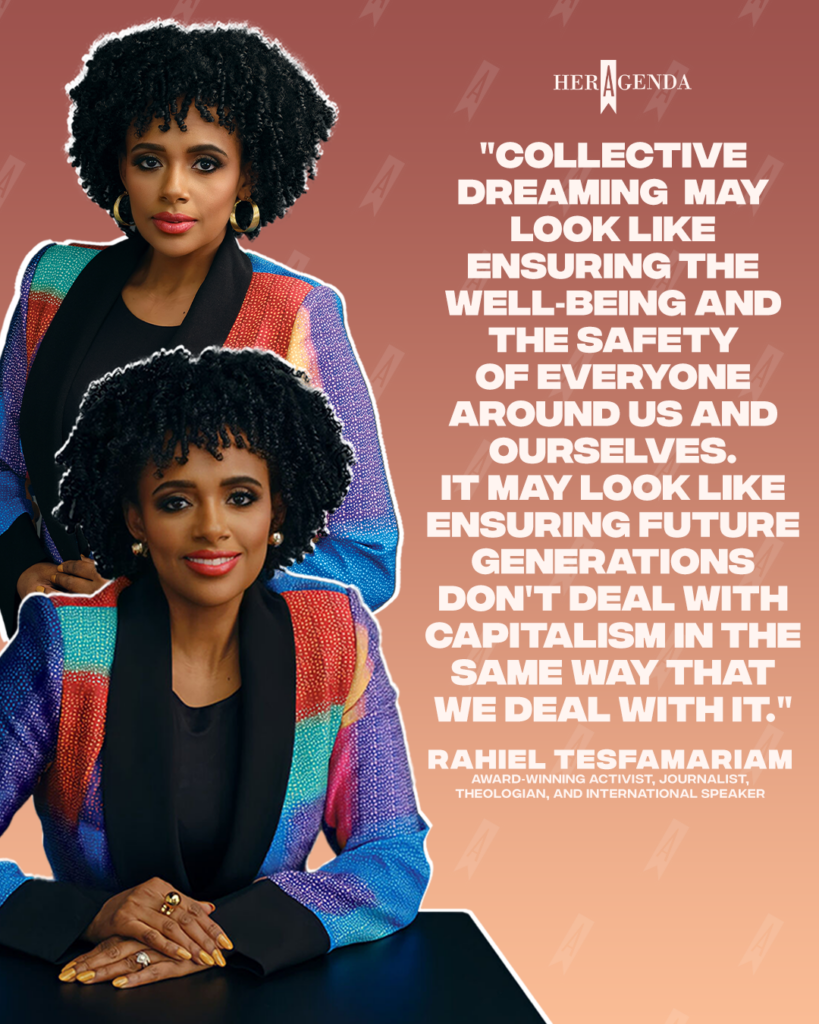
Her Agenda: What are the ideological and revolutionary Pan-African ties that bind Africa and Black America, and what is needed today to better shape our shared future?
Rahiel Tesfamariam: Black America and Africa have always been connected in their freedom struggle. We know this from the anti-colonial struggle and the intersection of that with the civil rights movement. There’s a lot of history about SNCC and its ties to Africa. There’s a lot of history about it. I write in my book about Dr. [Martin Luther] King and how he was influenced by pioneers like Kwame Nkrumah. And so a lot of the freedom fighters on the continent and in the United States were learning from each other. The African freedom fighters were learning about the civil rights movement, and the civil rights leaders were learning about the anti-colonial struggle in Africa, literally taking notes from each other and learning how to advance the local struggle based on what was happening overseas. Unfortunately, those same intersections are not made as much today. We don’t know as many of their freedom fighters’ names. We don’t know who they are.
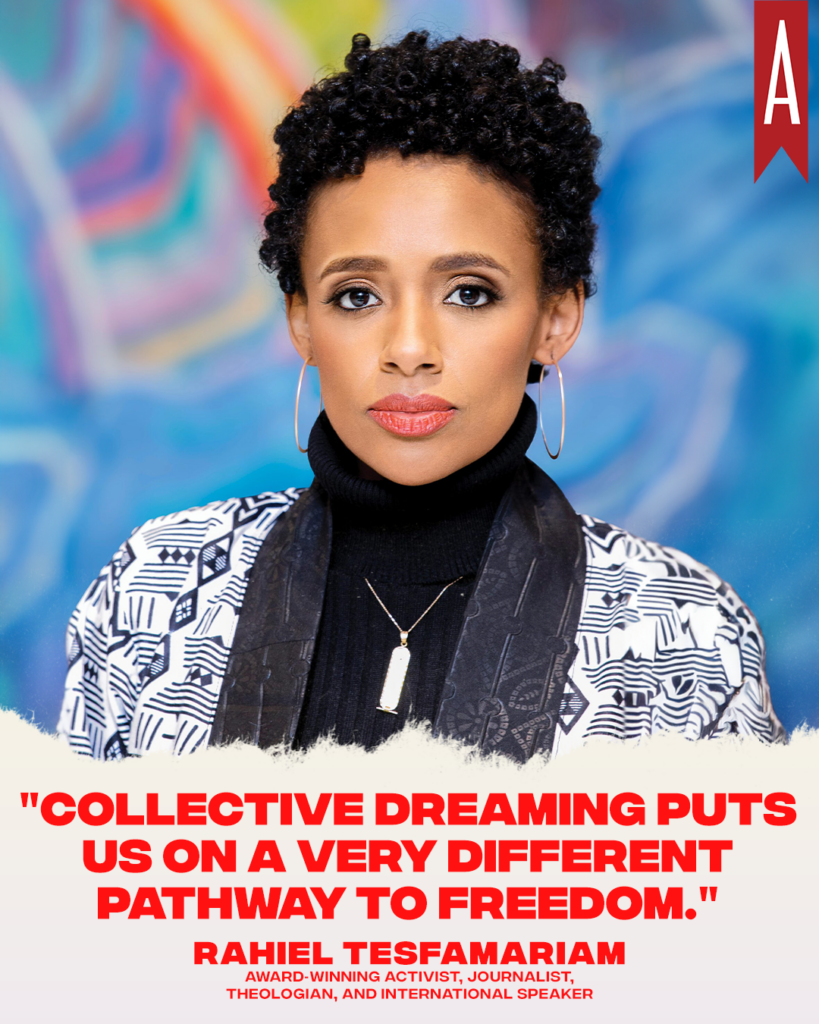
Her Agenda: And then, amidst the Ferguson uprising, you led the Not One Dime, a national economic boycott, now almost a decade ago.Why should the Ferguson uprising be seen as more than just a moment that passed, and how did it serve as a catalyst for the Black millennial movement?
Rahiel Tesfamariam: Ferguson, in many ways, I believe, led to a shift in how a lot of Black millennial activists understood their role in this country and understood themselves in this country. It was a divergence from the civil rights movement, more conflict-driven and more antagonistic. It was the idea that respectability politics was not saving us, and we needed to find a more authentic, generationally relevant way to confront police brutality and state violence. And I think the remnants of that shift in thinking and tactics are with us today. You see a very defiant generation that just refuses to play nice.
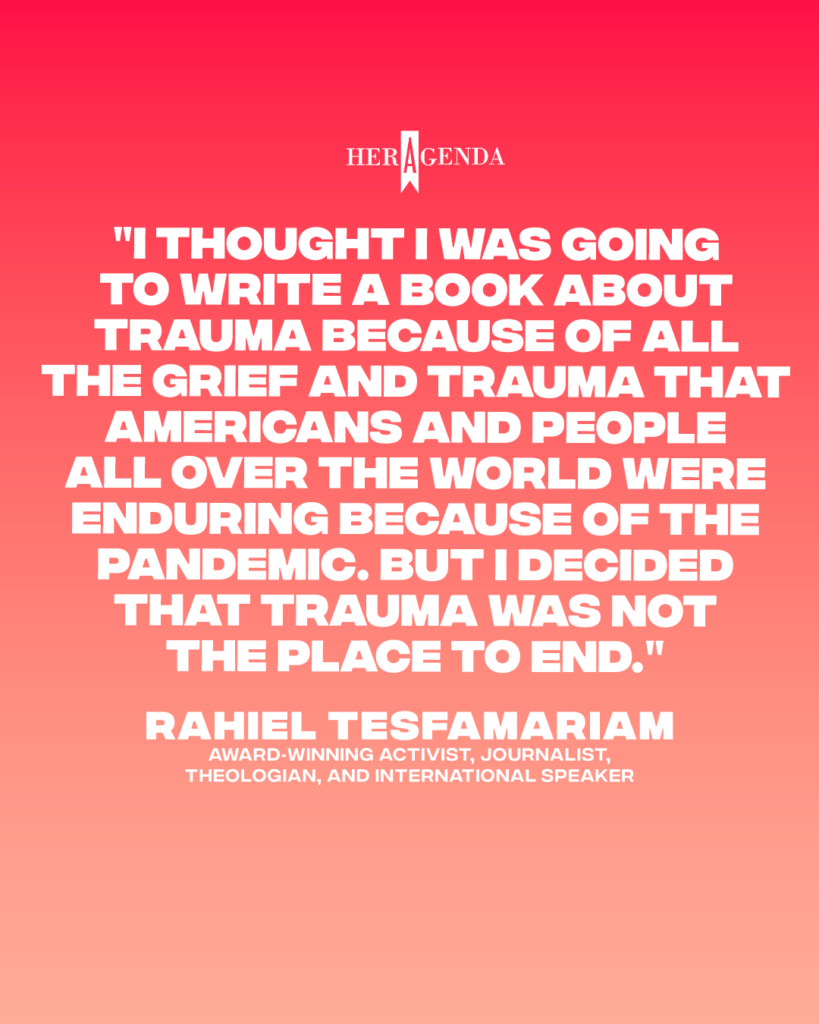
Her Agenda: How can revolutionary love transform our communities, and why is fiercely loving and protecting Black women essential to Black resistance?
Rahiel Tesfamariam: Well, that chapter begins by me talking about the violent removal of families, the violent disintegration that white supremacists understood how critical the family structure was to Black cohesion and Black power. And we should always take note of the tactics of our enemy and play offense and defense. I think that understanding how important the Black family structure is to our building of power and to our maintaining class solidarity [and] racial solidarity has a huge effect on us in many ways; and it has a multi-generational effect as well.
Part of that unity is tied to the love, respect, and care that is bestowed upon Black women. The Say Her Name movement was created to ensure that Black women’s names were lifted up in this fight against police brutality. And oftentimes, women are not understood to be victims of state violence in the same ways that men are. We don’t mourn them as long. We don’t know their names, or their stories as much. And so just as we should protect them nationally in these issues of police brutality, it’s the same way that Black women should be protected on the home front and intimately. The defense of Black women is critical in a world where, as Malcolm X argued, Black women are the most disrespected people in America, and if that is true, we need Black men to support us.
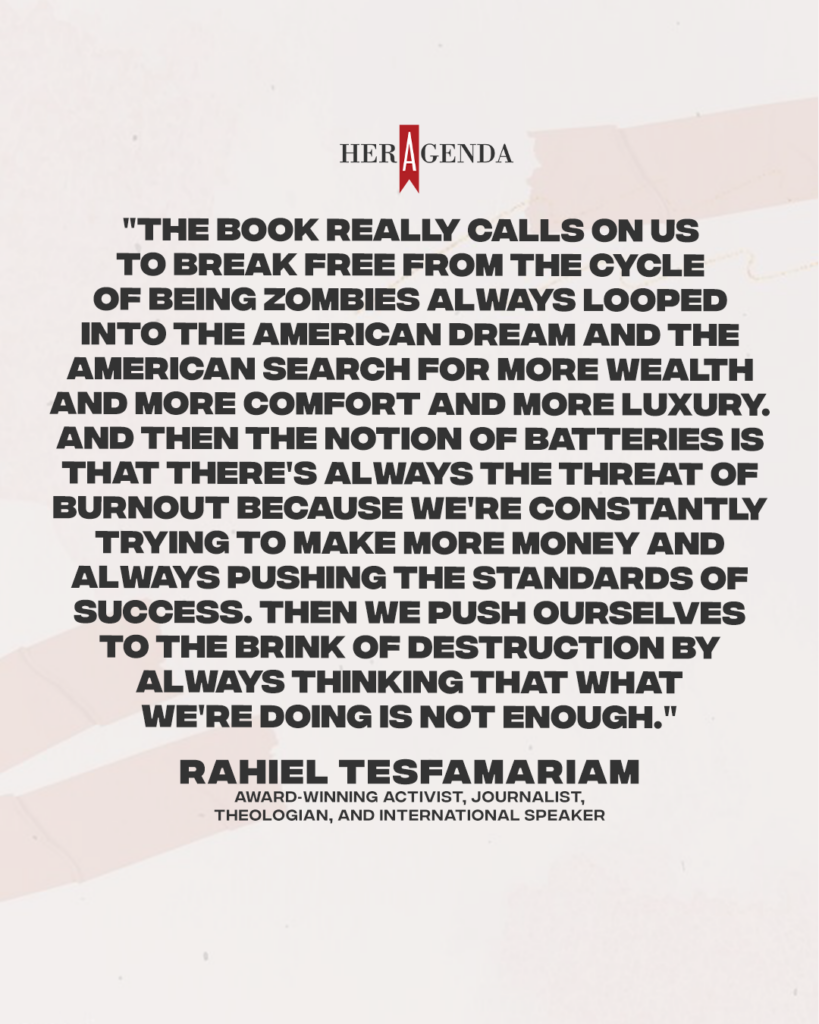
Her Agenda: How are many individual and collective freedom struggles rooted in the quest for self-determination? What does this mean for the future of these movements?
Rahiel Tesfamariam: Much of all these struggles are rooted in this desire to have autonomy, whether that’s political autonomy, economic autonomy, spiritual autonomy, every autonomy you can think of, is the desire to not have ourselves, our people, our children governed by somebody else’s will. And so that’s what it means when we say the power of the people. The people have to be able to exercise power, to govern themselves, [and] to decide what’s in their best interest. I think it’s important to recognize that self-determination is still a struggle. I think many may not use that word today and may think of it more so. A lot of people look at self-determination as a thing of the past, as part of the anti-colonial struggle. But self-determination is manifesting more and more every day in America when we talk about bodily autonomy when we talk about voter suppression. We’re talking about ways in which people who do not see the world the same way as us seek to control us. So it’s still, and not to even mention, the banning of books and controlling what can be taught in classrooms. It’s like we have to have the capacity to learn what we need to learn to be who we want to be and do what we want to do in the world. And if you can control our mind and our way of thinking, if you can control our bodies, then you control everything. So what we’re ultimately seeing is a power struggle. And this power struggle is affecting every inch of our lives. And until we understand it as a power struggle, we’ll see these issues as a one-off, but they’re not a one-off. I mean, the Supreme Court is a huge part of the fight to maintain our self-determination.
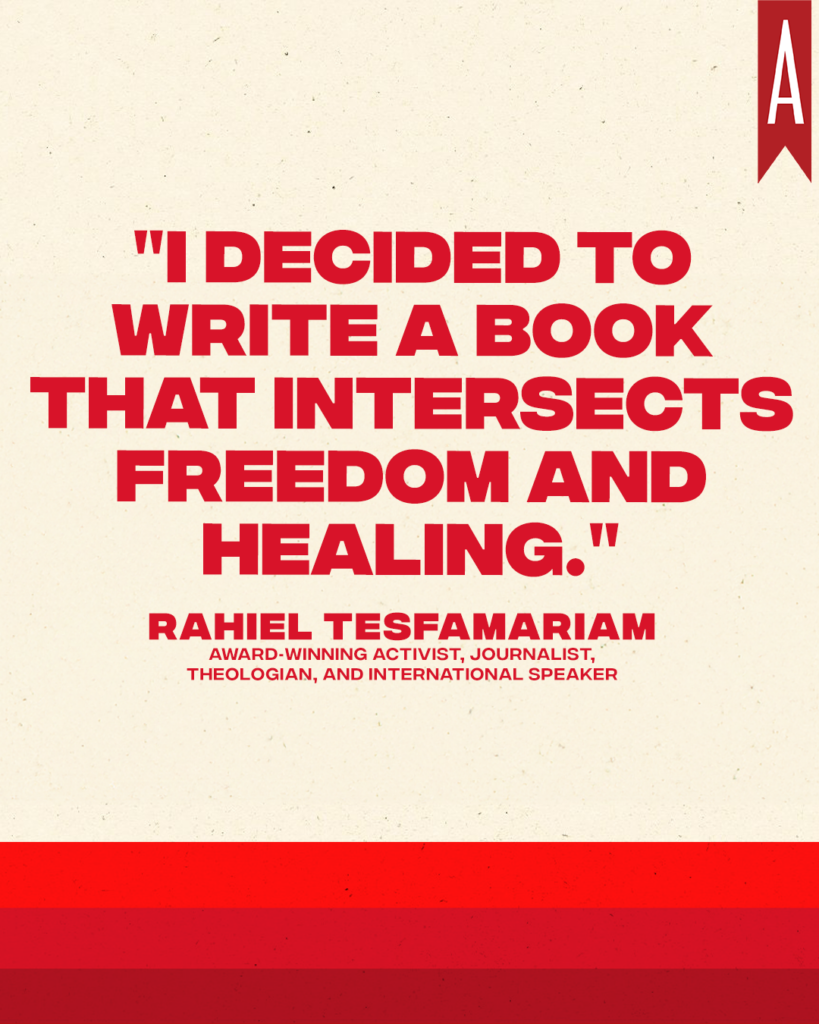
Her Agenda: What insight can you give to us about faith being an integral part of all of this?
Rahiel Tesfamariam: In the Black freedom struggle in America, faith was integral to how freedom seekers sought to advance liberation efforts in this country. There was no true dividing line between faith and freedom. I mean, whether that was Harriet Tubman or Nat Turner, our icons often were driven by faith. And so I encourage this generation to not give up what I call their spiritual inheritance, that it’s not just about fighting for freedom, but it’s about the faith that compels us to believe that it’s possible to gain freedom. Because one of the most important questions I get from young people every day is, how do you maintain hope? How do you sustain hope? And faith is the substance of things hoped for, that evidence of things not seen. So faith is absolutely instrumental in our holding on to hope, and hope is what fuels us to continue the freedom struggle. So it’s important that we maintain hope through a lens of faith, but also being very critical about what kind of faith we have. And that’s why I wrote the chapter on decolonizing God, to ensure that our faith and spirituality is not an extension of our subjugation, because there are a lot of ways in which white supremacists have used faith to subjugate Black Americans throughout the centuries. And so we have to be very intentional so that our faith commitments do not intersect with the ways that white supremacy and capitalism are harming us.
[Editor’s note: This interview has been edited for length and clarity.]

